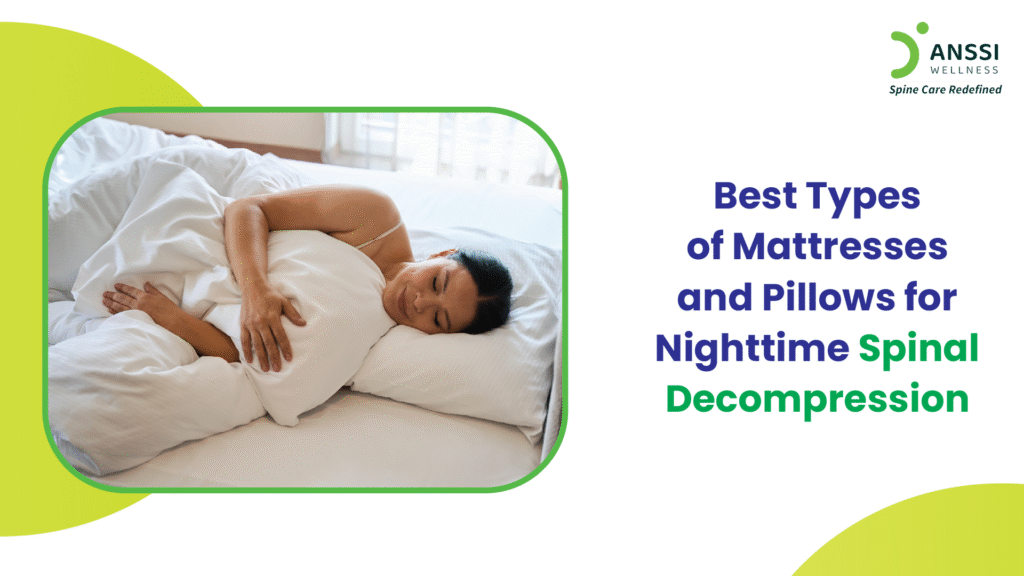A good night’s sleep is not just about feeling rested; it’s also about giving your spine the care it needs. The average person spends nearly one-third of their life sleeping, and the quality of their sleep surface directly impacts spinal alignment and health.
If your mattress or pillow fails to support your spine properly, it can lead to stiffness, discomfort, and even chronic back or neck pain. On the other hand, the right sleeping setup can aid in nighttime spinal decompression, a natural process that helps your spine recover from daily stress.
How Sleep Affects Spinal Decompression
When you stand or sit during the day, gravity constantly compresses your spine. This pressure causes the discs between your vertebrae to slowly lose their fluids and their integrity.
Lying down at night reduces this load, allowing the discs to rehydrate and regain their cushioning ability.
However, this natural repair process works best when your spine maintains its neutral alignment while you sleep. A poorly designed mattress or pillow can disrupt this alignment, preventing optimal decompression and even causing new strain.
Choosing the Right Mattress
Choosing the right sleep surface is an investment in your spine’s long-term health.
Medium-Firm for Balanced Support
For most people, a medium-firm mattress strikes the best balance between comfort and support. It allows your spine to rest in its natural curve without sagging excessively or feeling uncomfortably rigid.
Memory Foam for Contouring
Memory foam mattresses adapt to your body’s shape, providing targeted support for the shoulders, hips, and lower back. This contouring effect helps keep your spine aligned, reducing pressure points that can force you to move around restlessly.
Latex for Durability and Natural Alignment
Natural latex mattresses are known for their resilience and supportive feel. They offer gentle cushioning without letting your body sink too deeply, making them ideal for spinal decompression. Plus, they’re naturally hypoallergenic (less likely to cause any allergy) and long-lasting.
Motion Isolation for Couples
If you share your bed, a mattress with good motion isolation (like memory foam or hybrid models) ensures your partner’s movements don’t disrupt your spinal alignment during the night.
Avoid Too Soft or Too Hard Surfaces
Overly soft mattresses can let your body sink too far, creating spinal misalignment, while overly hard ones can push against pressure points, preventing your muscles from fully relaxing.
Choosing the Right Pillow
The combination of the right pillow with your mattress can actively promote spinal decompression, reduce morning stiffness, and prevent long-term spinal problems.
Cervical Pillows for Neck Support
Cervical pillows are designed to maintain the natural curve of your neck, preventing strain and aiding spinal decompression in the cervical region.
Memory Foam Pillows for Adaptive Comfort
Like mattresses, memory foam pillows mould to your head and neck shape, providing consistent support throughout the night.
Adjustable Pillows for Personal Comfort
Some pillows allow you to add or remove filling, making it easy to adjust the height to your sleeping style.
Different Sleeping Positions, Different Needs
- Side sleepers need a thicker pillow to keep the head aligned with the spine.
- Back sleepers benefit from a medium-loft pillow that supports the neck without pushing the head forward.
- Stomach sleepers should opt for a thin pillow or no pillow at all to avoid neck strain.
Additional Tips for Nighttime Spinal Health
- Replace Your Mattress Regularly: Most mattresses lose their supportive properties after 7-10 years.
- Prioritise Alignment: Keep your neck, mid-back, and lower back in a straight line while sleeping.
- Use Supportive Positions: Side sleeping with a pillow between your knees or back sleeping with a pillow under your knees can reduce spinal stress.
- Consider Climate and Material Preferences: Cooling gel layers, breathable covers, and hypoallergenic fabrics can enhance sleep quality while supporting spinal health.
About ANSSI:
ANSSI Wellness focuses on improving the quality of life for patients suffering from spinal issues, aiming to provide relief where other conventional treatments have failed. Through advanced non-surgical spinal decompression treatment, ANSSI is committed to helping patients avoid surgery and recover in a safe, effective, and compassionate environment.
Connect with ANSSI Wellness on LinkedIn, Instagram, and Facebook for expert guidance.




